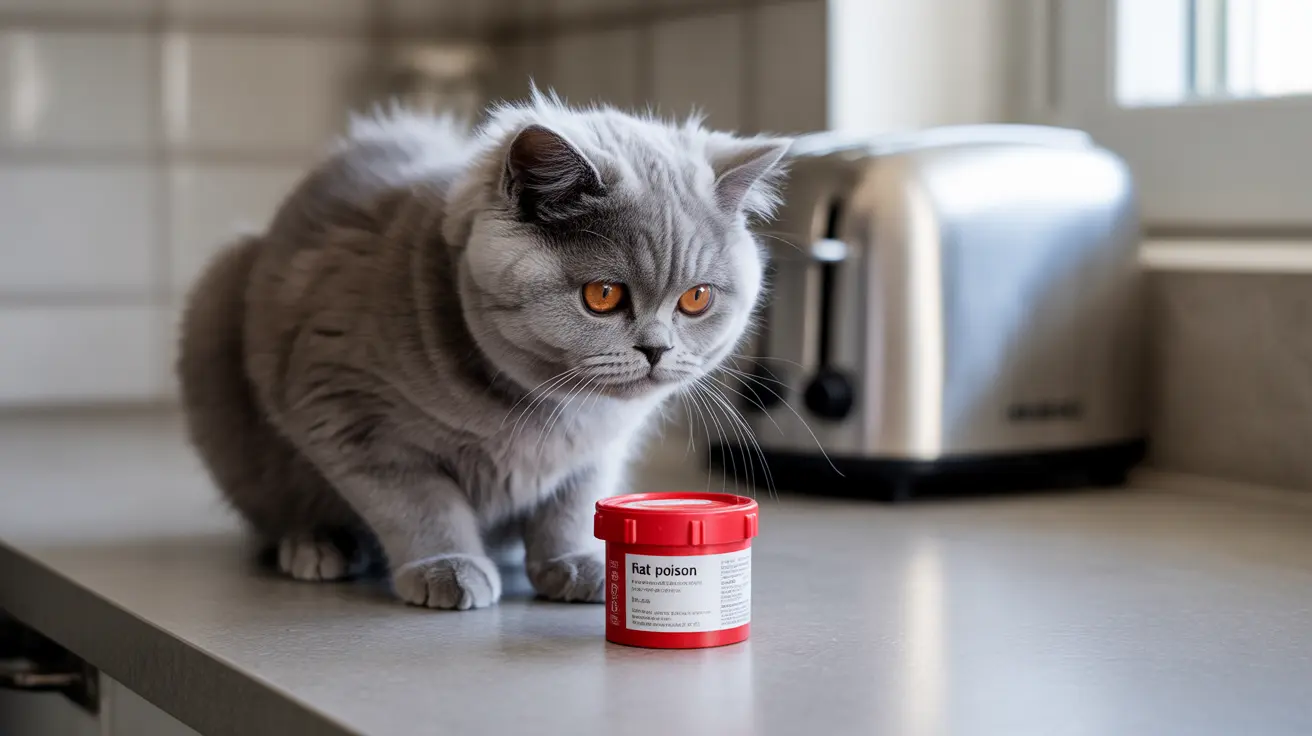The Serious Danger of Rat Poison to Cats
Rat poison poses a severe and potentially fatal threat to cats, whether they encounter it directly or through consuming poisoned rodents. As natural hunters, cats may be attracted to both the poison bait itself and poisoned prey, making them particularly vulnerable to rodenticide exposure.
Understanding this danger is crucial for cat owners, as even small amounts of rat poison can have devastating effects on feline health. The situation becomes even more critical because cats may not show immediate symptoms, leading to delayed treatment that could prove fatal.
How Rat Poison Affects Cats
Direct and Indirect Exposure
Cats can become poisoned in two primary ways: direct ingestion of rat poison or by eating rodents that have consumed the poison. Both scenarios can lead to severe toxicity, as modern rodenticides are designed to be highly potent and lethal.
Types of Rat Poison and Their Effects
Most rat poisons contain anticoagulant compounds that prevent blood clotting by blocking vitamin K activity. This leads to uncontrolled internal bleeding, which can be fatal without immediate treatment. Other types include bromethalin, which causes brain swelling, and cholecalciferol, which creates dangerous calcium elevation in the blood.
Recognizing Rat Poison Poisoning Symptoms
Early detection is crucial for survival. Watch for these warning signs:
- Lethargy and weakness
- Pale gums
- Bleeding from nose or mouth
- Blood in urine or stool
- Difficulty breathing
- Vomiting or diarrhea
- Loss of appetite
- Seizures or tremors
Emergency Response and Treatment
If you suspect your cat has been exposed to rat poison, immediate veterinary care is essential. Don't wait for symptoms to appear, as this could reduce the chances of survival. Treatment typically includes:
- Vitamin K1 therapy for anticoagulant poisoning
- Activated charcoal to prevent further absorption
- Supportive care including IV fluids
- Blood transfusions if necessary
- Specific antidotes based on the type of poison
Prevention and Safety Measures
Protecting your cat from rat poison exposure requires vigilance and preventive measures:
- Never use rat poison in areas accessible to cats
- Choose alternative pest control methods like traps
- Keep cats indoors when possible
- Regularly inspect your property for signs of rodenticide
- Inform neighbors about the dangers to pets
- Store any necessary pest control products securely
Frequently Asked Questions
Can rat poison kill my cat if it eats it directly or eats a poisoned rodent?
Yes, rat poison can be lethal to cats through both direct ingestion and consuming poisoned rodents. Even small amounts can cause severe illness or death without prompt treatment.
What are the common symptoms of rat poison poisoning in cats?
Common symptoms include lethargy, pale gums, bleeding (external or internal), difficulty breathing, vomiting, and seizures. However, symptoms may not appear immediately, making immediate veterinary care crucial upon suspected exposure.
How quickly should I take my cat to the vet if I suspect it has ingested rat poison or a poisoned mouse?
Take your cat to the vet immediately if you suspect exposure to rat poison or a poisoned rodent. Don't wait for symptoms to appear, as early treatment significantly improves survival chances.
What treatments are available for cats poisoned by anticoagulant rodenticides?
Treatment typically includes vitamin K1 therapy, activated charcoal, supportive care, and possibly blood transfusions. The specific treatment plan depends on the type of poison and severity of symptoms.
How can I prevent my cat from being exposed to rat poison or poisoned rodents in my home?
Prevent exposure by avoiding rodenticide use, choosing alternative pest control methods, keeping cats indoors when possible, and storing any necessary pest control products in secure, inaccessible locations.
Conclusion
Rat poison exposure represents a serious and potentially fatal threat to cats. Understanding the risks, recognizing symptoms, and taking immediate action are crucial for saving your cat's life. The best approach is prevention through careful pest control choices and vigilant monitoring of your cat's environment.






